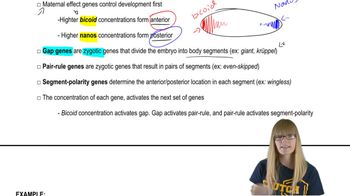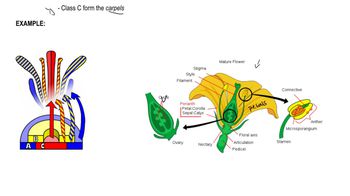Table of contents
- 1. Introduction to Genetics51m
- 2. Mendel's Laws of Inheritance3h 37m
- 3. Extensions to Mendelian Inheritance2h 41m
- 4. Genetic Mapping and Linkage2h 28m
- 5. Genetics of Bacteria and Viruses1h 21m
- 6. Chromosomal Variation1h 48m
- 7. DNA and Chromosome Structure56m
- 8. DNA Replication1h 10m
- 9. Mitosis and Meiosis1h 34m
- 10. Transcription1h 0m
- 11. Translation58m
- 12. Gene Regulation in Prokaryotes1h 19m
- 13. Gene Regulation in Eukaryotes44m
- 14. Genetic Control of Development44m
- 15. Genomes and Genomics1h 50m
- 16. Transposable Elements47m
- 17. Mutation, Repair, and Recombination1h 6m
- 18. Molecular Genetic Tools19m
- 19. Cancer Genetics29m
- 20. Quantitative Genetics1h 26m
- 21. Population Genetics50m
- 22. Evolutionary Genetics29m
14. Genetic Control of Development
Developmental Patterning Genes
Problem 17b
Textbook Question
Textbook QuestionOne of the most interesting aspects of early development is the remodeling of the cell cycle from rapid cell divisions, apparently lacking G1 and G2 phases, to slower cell cycles with measurable G1 and G2 phases and checkpoints. During this remodeling, maternal mRNAs that specify cyclins are deadenylated, and zygotic genes are activated to produce cyclins. Audic et al. [(2001). Mol. and Cell. Biol. 21:1662–1671] suggest that deadenylation requires transcription of zygotic genes. Present a diagram that captures the significant features of these findings.
 Verified Solution
Verified SolutionThis video solution was recommended by our tutors as helpful for the problem above
Video duration:
2mPlay a video:
Was this helpful?
Key Concepts
Here are the essential concepts you must grasp in order to answer the question correctly.
Cell Cycle Phases
The cell cycle consists of several phases, including G1 (gap 1), S (synthesis), G2 (gap 2), and M (mitosis). In early development, rapid cell divisions often skip G1 and G2, leading to a shorter cycle. As development progresses, these phases become more pronounced, allowing for regulation and checkpoints that ensure proper cell division and function.
Recommended video:
Guided course

Bacteriophage Life Cycle
Maternal mRNAs and Cyclins
Maternal mRNAs are RNA molecules inherited from the mother that play crucial roles in early embryonic development. They encode proteins such as cyclins, which are essential for regulating the cell cycle. During the transition from rapid divisions to a more regulated cycle, these maternal mRNAs undergo deadenylation, which affects their stability and translation, ultimately influencing cyclin production.
Recommended video:
Guided course

Maternal Effect
Zygotic Gene Activation
Zygotic gene activation refers to the process where the zygote begins to transcribe its own genes after fertilization. This activation is critical for the transition from maternal control to zygotic control of development. The transcription of zygotic genes is necessary for producing new cyclins, which help establish the slower, regulated cell cycle with distinct G1 and G2 phases.
Recommended video:
Guided course

Segmentation Genes

 11:19m
11:19mWatch next
Master Segmentation Genes with a bite sized video explanation from Kylia Goodner
Start learningRelated Videos
Related Practice


